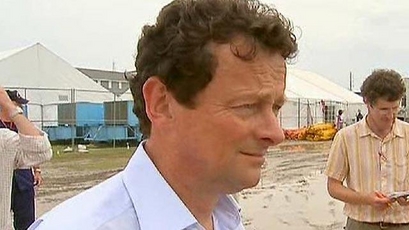LONDON – The Gulf of Mexico oil spill risked turning into a trans-Atlantic diplomatic rift Thursday after U.S. threats to have BP fork out billions more for the disaster caused a precipitous slide in the blue-chip's stock, hurting retirement savings for millions of Britons.
British lawmakers are even pushing Prime Minister David Cameron to get President Barack Obama to tone down his stinging criticism of the oil company, complaining that the hostile rhetoric will have severe implications for pensioners with nest eggs in the company.
The share slide has since April almost halved BP's market value to 69 billion pounds ($101 billion), costing it the spot as Britain's biggest company — and some worry it could become a takeover target for upstart firms in Asia. BP said there was no reason for the stock drop, stressing its strong finances.
Because of the rising hysteria, Cameron is expected to discuss the issue with Obama on a routine scheduled telephone call over the weekend.
British lawmakers want Cameron to stress the blue chip company's critical role in the national economy — some 18 million Britons hold shares in the company in one form or another, many through their pension funds.
"I would like to see a bit of cool heads rather than endlessly buck-passing and name-calling," said London Mayor Boris Johnson. "When you consider the huge exposure of British pension funds to BP it starts to become a matter of national concern if a great British company is being continually beaten up on the airwaves."
Cameron and his Foreign Secretary William Hague, who are both out of the country on business trips, took a conciliatory stance. In Afghanistan, Cameron said he understood "the U.S. government's frustration because it is a catastrophe for the environment."
In Germany, Hague said he hadn't detected any anti-British rhetoric: "The important thing here is dealing with the problem ... that's more important than any rhetoric that any of us may have indulged in."
BP shares fell in London after the White House suggested that BP should pay unemployment benefits to thousands of oil workers laid off during a moratorium on deep-sea drilling triggered by the spill.
The U.S. Justice Department added that it was planning to take action when asked at a Congressionalhearing if an injuction was being considered against BP's plans to pay investors a dividend, worth some $10 billion annually, this year.
"You attack the dividend and you are attacking millions of British pensioners," said Tom Watson, a member of the opposition Labour Party who planned to officially table a motion in the House of Commons supporting BP.
BP shareholders receive a dividend payment every quarter. It has held steady at 14 cents per share, worth a total of around $10 billion, since July 2008. BP is due to announce details of its second quarter payment with its earnings report on July 27, but it can make changes before then.
There are also worries that Obama, who earlier this week suggested he would fire BP CEO Tony Hayward if he could, will tap into U.S. anger as oil-coated pelicans and turtles continue to wash up on devastated beaches and impose longer term sanctions that would prevent BP from bidding for new contracts in the United States, where it is the biggest oil operator.
But markets were also beginning to heed warnings from analysts who said Wednesday's 15.8 percent sell-off of BP shares in New York was an overreaction — the company has lost around half its market value since the spill began with an April 20 explosion at the Deepwater Horizon rig that killed 11 people.
In London, the stock recovered some ground after dropping as much as 11 percent at the open to a 13-year low. It closed down 6.7 percent at 365.5 pence ($5.35).
In New York, the stock opened 9.8 percent higher at $32.05, clawing back some of the losses from a 15.8 percent rout on Wednesday.
BP said Thursday that it was capturing more oil in a containment system as it reported that costs so far had risen to almost $1.5 billion — a hefty amount but still manageable given the company turned a $16 billion profit last year.
Hayward has consistently declined to speculate on the final bill, but in an attempt to calm investors on Thursday, the company pointed to its supportive additional cash flow from other projects, its strong debt to equity ratio and its proven reserves. It had more than 18 million barrels of proven reserves and 63 billion barrels of resources at the end of 2009.
"We don't believe BP has a funding issue, but given the overwhelmingly hostile nature of the U.S. government the company may decide to suspend payments until the wells are capped and the clean-up sufficiently advanced to convince the U.S. that it can afford all the costs as well as pay dividends," said Evolution Securities analyst Richard Griffith. "Unilateral action against BP over its U.S. operations, be it unreasonable or illegal, hangs over BP."
Robert Talbut, the chief investment officer at Royal London Asset Management, a shareholder in BP, said "there is a lot of very irrational and short-term selling going on." But he added that talk of a potential sale of assets or takeover bid — PetroChina Ltd. has been suggested by some as a potential suitor — was not surprising.
"I can understand exactly why someone else would want to buy the BP assets because I think they are grossly undervalued at the moment," he said. "As a shareholder, it's not something I would welcome."
___
Associated Press Writer Robert Barr contributed to this story.
http://news.yahoo.com/s/ap/20100610/ap_on_bi_ge/eu_britain_bp_shares











